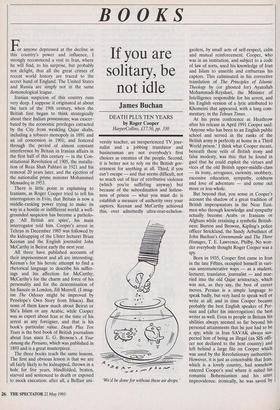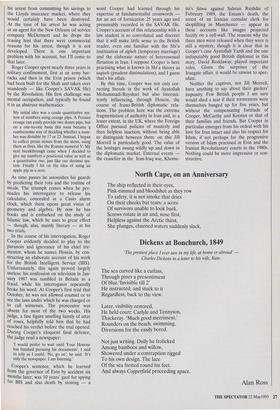BOOKS
If you are
solitary, be not idle
James Buchan
DEATH PLUS TEN YEARS by Roger Cooper
HalperCollins, 177.50, pp. 330
For anyone depressed at the decline in this country's power and influence, I strongly recommend a visit to Iran, where he will find, to his surprise, but probably not delight, that all the great crimes of recent world history are traced to the secret hand of England. The United States and Russia are simply not in the same demonological league.
Iranian suspicion of this country runs very deep. I suppose it originated at about the turn of the 19th century, when the British first began to think strategically about their Indian possessions; was exacer- bated by the economic privileges extracted by the City from weakling Qajar shahs, including a tobacco monopoly in 1891 and an oil concession in 1901; and festered through the period of almost constant interference by Britain in Iranian affairs in the first half of this century — in the Con- stitutional Revolution of 1905, the installa- tion of Reza Shah Pahlavi in 1921 and his removal 20 years later, and the ejection of the nationalist prime minister Mohammed Mossadeq in 1953.
There is little point in explaining to Iranians, as Roger Cooper tried to tell his interrogators in Evin, that Britain is now a middle-ranking power trying to make its way in a hostile. or indifferent world: a well- grounded suspicion has become a patholo- gy. 'All British are spies', his main interrogator told him. Cooper's arrest in Tehran in December 1985 was followed by the kidnapping of the Ulster lecturer Brian Keenan and the English journalist John McCarthy in Beirut early the next year.
All three have published accounts of their imprisonment and all are interesting: Keenan's for his heroic attempt to find a rhetorical language to describe his suffer- ings and his affection for McCarthy; McCarthy's for the charm and force of his personality and for the determination of his fiancée in London, Jill Morrell. (I imag- ine The Odyssey might be improved by Penelope's Own Story from Ithaca). But none of them knew much about Beirut or Shi'a Islam or any Arabic, while Cooper was as expert about Iran at the time of his arrest as any foreigner, and that is his book's particular value. Death Plus Ten Years is the best book of British journalism about Iran since E. G. Browne's A Year Among the Persians, which was published in 1893 and is a great masterpiece.
The three books teach the same lessons. The first and obvious lesson is that we are all fairly likely to be kidnapped, thrown in a hole for five years, blindfolded, beaten, starved and sentenced to death or exposed to mock execution: after all, a Belfast uni- versity teacher, an inexperienced TV jour- nalist and a jobbing translator and businessman are not everybody's first choices as enemies of the people. Second, it is better not to rely on the British gov- ernment for anything at all. Third, if you can't escape — and that seems difficult, not so much out of fear of retributive violence (which you're suffefing anyway) but because of the subordination and listless- ness of prison — what you must do is establish a measure of authority over your captors. Keenan and McCarthy achieved this, over admittedly ultra-rear-echelon- 'We'd be done for without these air drops.' gaolers, by small acts of self-respect, calm and mutual reinforcement. Cooper, who was in an institution, and subject to a code of law of sorts, used his knowledge of Iran and Islam to unsettle and embarrass his captors. This culminated in his corrective translation of The Principles of Islamic Theology by (or ghosted for) Ayatollah Mohammadi-Reyshari, the Minister of Intelligence responsible for his arrest, and his English version of a lyric attributed to Khomeini that appeared, with a long com- mentary, in the Tehran Times.
At his press conference at Heathrow after his release in April 1991 Cooper said: `Anyone who has been to an English public school and served in the ranks of the British army is perfectly at home in a Third World prison.' I think what Cooper meant, beneath these veils of British irony and false modesty, was this: that he found in gaol that he could exploit the virtues and vices of the old British upper-middle-class — its irony, arrogance, curiosity, snobbery, excessive education, sympathy, coldness and love of adventure — and come out more or less whole.
But beyond that, you sense in Cooper's account the shadow of a great tradition of British impersonators in the Near East, men who through knowledge and sympathy actually become Arabs or Iranians or Afghans while retaining a symbolic British- ness: Burton and Browne, Kipling's police officer Strickland, the Sandy Arbuthnot of John Buchan's Greenmantle and The Three Hostages, T. E. Lawrence, Philby. No won- der everybody thought Roger Cooper was a spy.
Born in 1935, Cooper first came to Iran in the late Fifties, occupied himself in vari- ous unremunerative ways — as a student, lecturer, translator, journalist — and mar- ried into the old Qajar aristocracy, which was not, as they say, the best of career moves. Persian is a simple language to speak badly, but very hard to speak well or write at all; and in time Cooper became probably the best English speaker of Per- sian and (after his interrogation) the best writer as well. Even to people in Britain his abilities always seemed so far beyond his personal attainments that he just had to be a spy; while in Iran SAVAK always sus- pected him of being an illegal (an SIS offi- cer not declared to the host country) and left behind a large file on Cooper which was used by the Revolutionary authorities. However, it is just as conceivable that Iran, which is a lovely country, had somehow entered Cooper's soul where it suited his romantic Bohemianism and his utter improvidence: ironically, he was saved by his arrest from committing his savings to the Lloyds insurance market, where they would certainly have been destroyed. At the time of his arrest he was acting as an agent for the New Orleans oil service company McDermott and he drops the teasing hint that there were commercial reasons for his arrest, though it is not developed. There is one important problem with his account, but I'll come to that later.
Roger Cooper spent nearly three years in solitary confinement, first at an army bar- racks and then in the Evin prison (which had been built for the Shah and taken over seamlessly — like Cooper's SAVAK file) by the Revolution. His first challenge was mental occupation, and typically he found it in an abstruse mathematics:
My initial idea was a crude quantitative sys- tem of numbers using orange pips. A Persian orange can easily provide two dozen pips, but on a one-to-one basis this soon became a cumbersome way of deciding whether a num- ber was divisible by 17 or 23. Instead, I began to collect prune stones from the stews, using them as fives, like the Roman numeral V. My next breakthrough came when I decided to give my numbers a positional value as well as a quantitative one, just like our decimal sys- tem. Finally I hit on the idea of using an apple pip as a zero.
As time passes he astonishes his guards by predicting their rota and the routine of meals. The triumph comes when he per- suades his interrogator to release his calculator, concealed in a Casio alarm clock, which them opens great vistas of geometry and algebra. By now he has books and is embarked on the study of Islamic law, which he uses to great effect — though, alas, mainly literary — at his two trials.
In the course of his interrogation, Roger Cooper evidently decided to play to the paranoia and ignorance of his chief tor- mentor, whom he names Hosein, by con- structing an elaborate account of his work for the British Intelligent Service (BIS). Unfortunately, this again proved largely useless: his confession on television in Jan- uary 1987 was rumbled in Britain as a fraud, while his interrogator repeatedly broke his word. At Cooper's first trial that October, he was not allowed counsel or to see the laws under which he was charged or to call witnesses. The prosecutor was absent for most of the two weeks. His judge, a fine figure smelling faintly of attar of roses, helpfully told him that he had reached his verdict before the trial opened. During Cooper's eloquent final defence, the judge read a newspaper:
`I would prefer to wait until Your Honour has finished perusing his documents', I said as icily as 1 could. 'No, go on', he said. 'It's only the newspaper. I am listening.'
Cooper's sentence, which he learned from the governor of Evin by accident six months later, was 10 years' gaol for spying for BIS and also death by stoning — a
word Cooper had learned through his expertise at fundamentalist crosswords for an act of fornication 25 years ago and presumably recorded in the SAVAK file. Cooper's account of this relationship with a law student is so convoluted and discreet that it will make little sense to the British reader, even one familiar with the Shi'a instituation of sigheh (temporary marriage) and the elaborate nature of heterosexual flirtation in Iran. I suppose Cooper is here practising what is known in Shi'a theory as taqiyeh (prudent dissimulation), and I guess that's his affair.
By this time, Cooper was not only cor- recting literals in the work of Ayatollah Mohammadi-Reyshari but also intermit- tently influencing, through Hosein, the course of, Irano-British diplomatic rela- tions. The problem here was the extreme fragmentation of authority in Iran and, to a lesser extent, in the UK, where the Foreign Office pursued policies of masterly and then helpless inaction, without being able to distinguish between them: on this Jill Morrell is particularly good. The value of the hostages swung wildly up and down in the diplomatic market. External events the ceasefire in the Iran-Iraq war, Khome- ini's fatwa against Salman Rushdie of February 1989, the Emam's death, the arrest of an Iranian consular clerk for shoplifting in Manchester — appear in these accounts like images projected fuzzily on a cell-wall. The reasons why the three men were released when they were is still a mystery, though it is clear that in Cooper's case Ayatollah Yazdi and the one indisputably good British diplomat in this story, David Reddaway, played important roles. Given the surprises of the Irangate affair, it would be unwise to spec- ulate.
Neither the captives, not Jill Morrell, have anything to say about their gaolers' impunity. Few British people I am sure would shed a tear if their tormentors were themselves banged up for five years, but without the compensating fortitude of Cooper, McCarthy and Keenan or that of their families and friends. But Cooper in particular emerges from his ordeal with his love for Iran intact and also his respect for Islam, if not perhaps for the progressive version of Islam practised in Evin and the Iranian Revolutionary courts in the 1980s. Nothing could be more impressive or con- structive.



















































 Previous page
Previous page